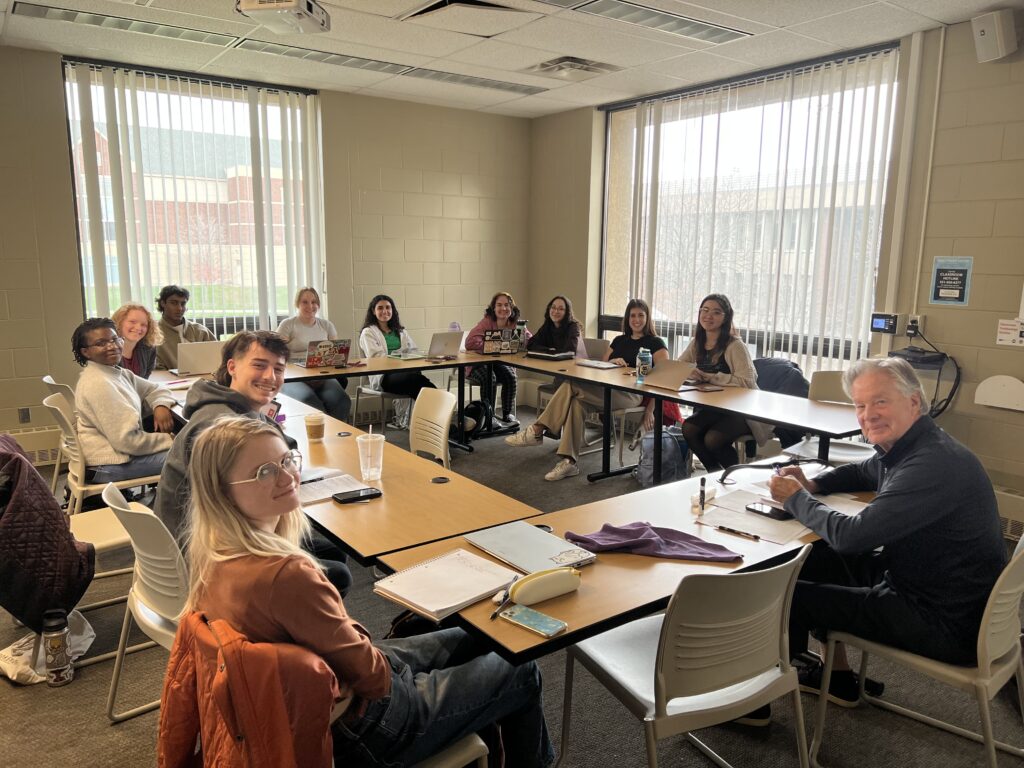Course Descriptions

Classical Mediterranean and Middle East
CLAS 101 - The Classical Mediterranean and Middle East
Frequency: Spring semester.
CLAS 111 - Elementary Latin I
Frequency: Every year.
CLAS 113 - Elementary Arabic I
Frequency: Every year.
CLAS 115 - Elementary Greek I
Frequency: Alternate fall semesters.
CLAS 117 - Elementary Hebrew I
Frequency: Alternate years.
CLAS 121 - The Greek World
Frequency: Alternate years.
Cross-Listed as: HIST 121
CLAS 122 - The Roman World
Frequency: Alternate years.
Cross-Listed as: HIST 122
CLAS 127 - Women, Gender and Sexuality in Ancient Greece and Rome
Frequency: Alternate years.
Cross-Listed as: WGSS 127
CLAS 129 - Greek Myths
Frequency: Alternate years.
CLAS 130 - Early Arab and Persian Empires
Frequency: Every other year.
CLAS 135 - India and Rome
Frequency: Alternate years.
Cross-Listed as: RELI 135
CLAS 145 - Pagans, Christians and Jews in Classical Antiquity: Cultures in Conflict
Frequency: Alternate years.
Cross-Listed as: RELI 145
CLAS 155 - January in Rome: The Art, Archaeology, and Urban History of Ancient Rome
Frequency: Alternate years.
CLAS 194 - Topics Course
CLAS 200 - Ancient and Medieval Philosophies
Frequency: Every year.
Cross-Listed as: PHIL 200
CLAS 201 - Classics in Film
Frequency: Alternate years.
CLAS 202 - Sanskrit and Classical Religion in India
Frequency: Alternate years.
CLAS 212 - Elementary Latin II
Frequency: Every year.
Prerequisite(s): CLAS 111.
CLAS 214 - Elementary Arabic II
Frequency: Every year.
Prerequisite(s): CLAS 113.
CLAS 218 - Elementary Hebrew II
Frequency: Alternate years.
Prerequisite(s): CLAS 117.
CLAS 220 - Ancient Healing and Medicine
Frequency: Offered occasionally.
CLAS 223 - Introduction to Archaeology
Frequency: Every year.
Cross-Listed as: ANTH 223
CLAS 231 - Intermediate Latin I: Prose
Frequency: Every fall.
Prerequisite(s): CLAS 212 or its equivalent.
CLAS 235 - Elementary Greek II
Frequency: Alternate fall semesters.
Prerequisite(s): CLAS 115 .
CLAS 237 - Intermediate Hebrew I
Frequency: Alternate years.
Prerequisite(s): CLAS 218 or its equivalent.
CLAS 241 - Intermediate Arabic I
Frequency: Every year.
Prerequisite(s): CLAS 214 or equivalent.
CLAS 260 - Introduction to Art History I: From Prehistory to the Medieval Period
Cross-Listed as: ART 160
CLAS 261 - Intermediate Greek: Prose
Frequency: Alternate fall semesters.
Prerequisite(s): CLAS 235 or equivalent.
CLAS 270 - Cultural Resource Management
Frequency: Occasionally offered.
Cross-Listed as: ANTH 270
CLAS 280 - Art and Architecture of Ancient Egypt
Frequency: Alternate fall semesters.
Cross-Listed as: ART 280
CLAS 282 - Art and Architecture of the Islamic World
Cross-Listed as: ART 282
CLAS 283 - Art and Architecture of Ancient Greece and Rome
Frequency: Alternate spring semesters.
Cross-Listed as: ART 283
CLAS 294 - Topics Course
CLAS 332 - Intermediate Latin II: Poetry
Frequency: Every spring.
Prerequisite(s): CLAS 231or equivalent.
CLAS 338 - Intermediate Hebrew II
Frequency: Alternate years.
Prerequisite(s): CLAS 237 or equivalent.
CLAS 342 - Intermediate Arabic II
Frequency: Every year.
Prerequisite(s): CLAS 241 or equivalent.
CLAS 362 - Intermediate Greek: Poetry
Frequency: Alternate spring semesters.
Prerequisite(s): CLAS 261or equivalent.
CLAS 392 - Topics Course
CLAS 394 - Topics Course
CLAS 482 - Advanced Archaeology Seminar
Frequency: Offered occasionally.
Prerequisite(s): CLAS 223
CLAS 483 - Advanced Reading in Latin
Frequency: Alternate years.
Prerequisite(s): CLAS 332or equivalent.
CLAS 485 - Advanced Arabic
Frequency: Every year.
Prerequisite(s): CLAS 342.
CLAS 487 - Advanced Reading in Greek
Prerequisite(s): CLAS 362 or equivalent.
CLAS 490 - Senior Seminar
Frequency: Every fall.
Prerequisite(s): Must be a declared Classics major
CLAS 494 - Topics Course
CLAS 601 - Tutorial
Frequency: Every semester.
Prerequisite(s): Permission of instructor and department chair.
CLAS 602 - Tutorial
Frequency: Every semester.
Prerequisite(s): Permission of instructor and department chair.
CLAS 603 - Tutorial
Frequency: Every semester.
Prerequisite(s): Permission of instructor and department chair.
CLAS 604 - Tutorial
Frequency: Every semester.
Prerequisite(s): Permission of instructor and department chair.
CLAS 611 - Independent Project
Frequency: Every semester.
Prerequisite(s): Permission of instructor and department chair.
CLAS 612 - Independent Project
Frequency: Every semester.
Prerequisite(s): Permission of instructor and department chair.
CLAS 613 - Independent Project
Frequency: Every semester.
Prerequisite(s): Permission of instructor and department chair.
CLAS 614 - Independent Project
Frequency: Every semester.
Prerequisite(s): Permission of instructor and department chair.
CLAS 631 - Preceptorship
Prerequisite(s): Permission of instructor. Work with Academic Programs.
CLAS 632 - Preceptorship
Prerequisite(s): Permission of instructor. Work with Academic Programs.
CLAS 633 - Preceptorship
Prerequisite(s): Permission of instructor. Work with Academic Programs.
CLAS 634 - Preceptorship
Prerequisite(s): Permission of instructor. Work with Academic Programs.